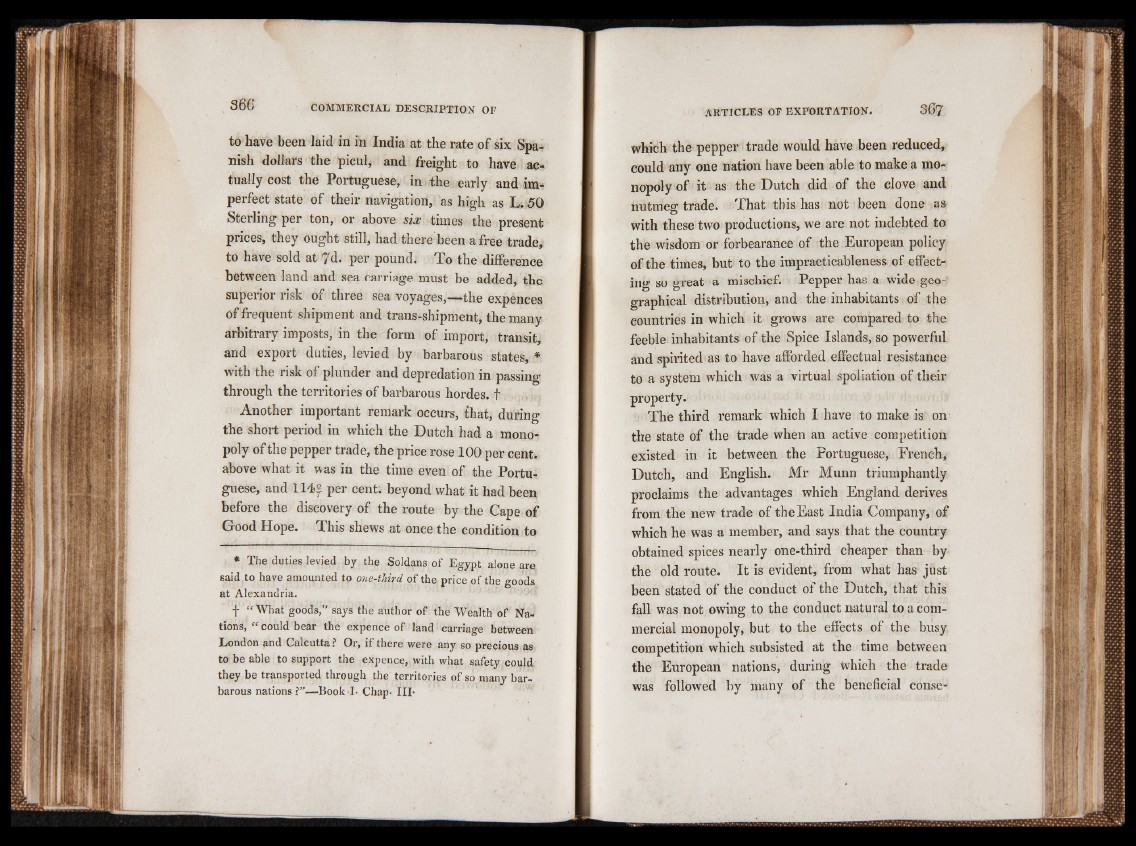
to have been laid in in India at the rate of six Spanish
dollars the picul, and freight to have actually
cost the Portuguese, in the early and imperfect
state of their navigation, as high as L. 50
Sterling per ton, or above six times the present
prices, they ought still, had there been a free trade,:
to have sold at 7d* per pound. To the difference
between land and sea carriage must be added, the
superior risk of three sea voyages,—the expences
of frequent shipment and trans-shipment, the many
arbitrary imposts, in the form of import, transit,
and export duties, levied by barbarous states, *
with the risk of plunder and depredation in passing
through the territories of barbarous hordes, t
Another important remark occurs, that, during
the short period in which the Dutch had a monopoly
of the pepper trade, the price rose 100 per cent,
above what it was in the time even of the Portuguese,
and 114® per cent; beyond what it had been
before the discovery of the route by the Cape of
Good Hope. This shews at once the condition to
* The duties levied by the Soldans of Egypt alone are.
6aid to have amounted to one-third of the price of the goods
at Alexandria.
f “ What goods,” says the author of the Wealth of Nations,
“ could bear the expence of land carriage between
London and Oalcutta ? Or, if there were any so precious as
to be able to support the expence, with what safety could
they be transported through the territories of so many barbarous
nations ?”—Book L Chap- IIIwhich
the pepper trade would have been reduced,
could any one nation have been able to make a monopoly
of it as the Dutch did of the clove and
nutmeg trade. That this has not been done as
with these two productions, we are not indebted to
the wisdom or forbearance of the European policy
of the times, but to the impracticableness of effecting
so great a mischief. Pepper has a wide geographical
distribution, and the inhabitants of the
countries in which it grows are compared to the
feeble inhabitants of the Spice Islands, so powerful
and spirited as to have afforded effectual resistance
to a system which was a virtual spoliation of their
property.
The third remark which I have to make is on
the state of the trade when an active competition
existed in it between the Portuguese, French,
Dutch, and English. Mr Munn triumphantly
proclaims the advantages which England derives
from the new trade of the East India Company, of
which he was a member, and says that the country
obtained spices nearly one-third cheaper than by
the old route. It is evident, from what has just
been stated of the conduct of the Dutch, that this
fall was not owing to the conduct natural to a commercial
monopoly, but to the effects of the busy
competition which subsisted at the time between
the European nations, during which the trade
was followed by many of the beneficial conse